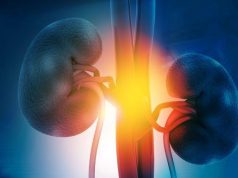Studies show no significant difference in BMI loss at five years between these laparoscopic procedures
WEDNESDAY, Jan. 17, 2018 (HealthDay News) — For patients with morbid obesity, there is no statistically significant difference in terms of weight loss at five years after laparoscopic sleeve gastrectomy versus laparoscopic Roux-en-Y gastric bypass, according to two studies published in the Jan. 16 issue of the Journal of the American Medical Association, a theme issue on obesity.
Ralph Peterli, M.D., from St. Claraspital in Basel, Switzerland, and colleagues conducted a randomized trial involving morbidly obese patients at four bariatric centers. Participants were randomized to undergo laparoscopic sleeve gastrectomy (107 patients) or laparoscopic Roux-en-Y gastric bypass (110 patients). The researchers observed no significant difference between the groups in excess body mass index loss at five years (61.1 percent for sleeve gastrectomy versus 68.3 percent for Roux-en-Y gastric bypass; absolute difference, −7.18 percent; 95 percent confidence interval, −14.30 to −0.06 percent; P = 0.22).
For the second study, Paulina Salminen, M.D., Ph.D., from Turku University Hospital in Finland, and colleagues enrolled 240 morbidly obese patients to examine the clinical equivalence of laparoscopic sleeve gastrectomy (121 patients) with laparoscopic Roux-en-Y gastric bypass (119 patients). The researchers found that the estimated mean percentage weight loss at five years was 49 and 57 percent after sleeve gastrectomy and gastric bypass, respectively (difference, 8.2 percentage points [95 percent confidence interval, 3.2 to 13.2 percent]), which did not meet the criteria for equivalence.
“Although gastric bypass compared with sleeve gastrectomy was associated with greater percentage excess weight loss at five years, the difference was not statistically significant, based on the prespecified equivalence margins,” Salminen and colleagues write.
Authors from both studies disclosed financial ties to the pharmaceutical industry.
Abstract/Full Text – Peterli (subscription or payment may be required)
Abstract/Full Text – Salminen (subscription or payment may be required)
Editorial (subscription or payment may be required)
Copyright © 2018 HealthDay. All rights reserved.








